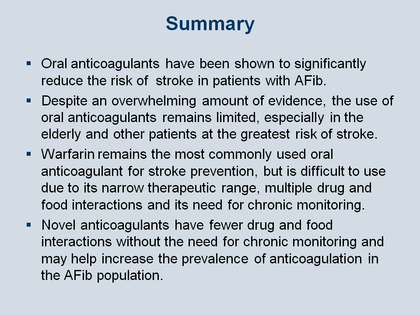Steven A. Rothman, MD - AFib Treatment: General Population - Figure 34
Summary
So in summary, oral anticoagulants have been shown to significantly reduce the risk of stroke in patients with AFib, but despite an overwhelming amount of evidence, the use of oral anticoagulants remains limited, and this is especially true in the elderly and in other patients who are at the greatest risk of stroke. Warfarin remains the most commonly used oral anticoagulant stroke prevention, but it is difficult to use due to its narrow therapeutic range, multiple drug and food interactions, and the need for chronic monitoring. The NOACs do have fewer drug and food interactions without the need for chronic monitoring and may help increase the prevalence of anticoagulation in the AFib population.
Rothman SA. Am J Med 2013; 126: 00-00.

